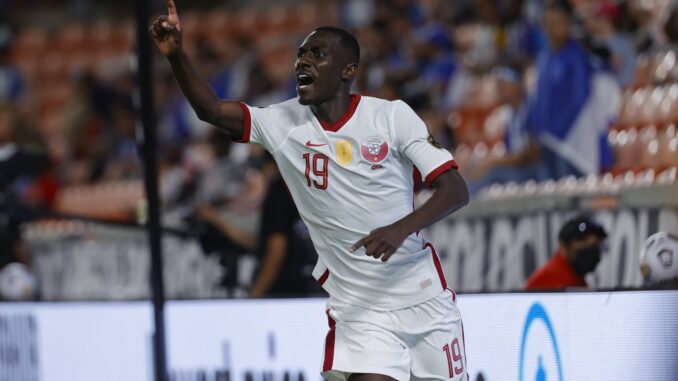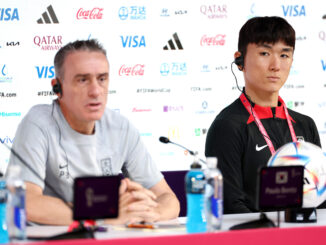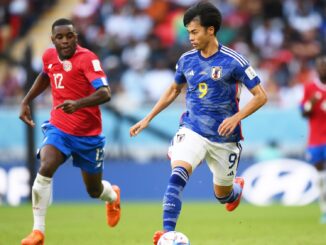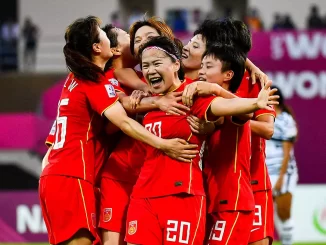

The Asian Game’s coverage of the FIFA World Cup Qatar 2022 is proudly sponsored by SMC.
As the World Cup edges ever closer, football fans from around the globe are starting to wonder what the hosts, current Asian champions Qatar have to offer on the pitch, following years of scrutiny concerning activities taking place off it.
Leading the charge in ensuring a positive first impression, central striker Almoez Ali will be pivotal in reflecting what modern Qatari football offers if the Maroon have any chance of recalibrating outside perceptions.
An unorthodox goalscorer, a record breaker, a regional star; Ali is set to reveal his huge potential on the world stage for the first time.
In a direct replication to their run up to the Asian Cup back in 2019, where most of this Qatari team headed into the competition as relative unknowns, even from within their own continent, Almoez Ali will be keen on underlining his tournament-changing impact as he did so spectacularly in the Emirates nearly four years ago.
From nowhere, to continental stardom
Ali’s rise to prominence has been squarely formed around this Qatar team; a modern looking, young team elevated by Spanish coach Felix Sanchez, from their early teens right through to the senior team, upon the tactician’s appointment in 2018.
Rather than gently bringing through the 2022-generation that would supplement a side that would make history at the World Cup, Sanchez instead trusted fully in those around him – turning the tables overnight, forming a brand new side around Almoez Ali as the focal point of the attack months out from a senior continental offering.
While there were early indications of Qatar and Almoez Ali’s capability, prompted with an early brace for his country against Ecuador in October that year, the true testing ground was to come in the form of the Asian Cup three months later in neighbouring UAE.
While Asian football fans, on the whole, were in a small part aware of Qatar’s fresh cohort of players growing at youth level – a team that had clinched a U19 title in 2014 (where Ali scored three goals) before impressive showings at the U23s in 2016 (Ali again notched two) and 2018 (six goals this time, a golden boot tally) – the senior level was seen as another matter entirely. Or so many thought.
Almoez Ali is an untypical modern-day striker. Lanky in frame, awkward at times in possession, but capable of the devastating in split moments.
His movement, positioning and relentless pursuit of goals has set him apart. Listen to him speak throughout his career, he talks of goals and very little more. While others, namely his national team coach Sanchez, have praised his all-round game, the big striker has had a one-track mind instilled in him since his youth days.
In the Emirates, this was immediately evident to those who might have missed him blitz through the youth ranks of continental football in the years previous.
Four goals in the opener against North Korea, and two in the final group stage clash against rivals Saudi Arabia; a tie politically charged at the time given the Middle East blockade that had been established only that previous year.
Ali’s relentless finishing only grew as the tournament progressed, scoring the crucial second against another rival and hosts UAE, before a stunning Goal of the Tournament effort against Japan in the final to clinch the title.
Ali’s form propelled Qatar into the continental gaze with an unlikely Asian Cup success, not only in their title win but in the manner of their victory; they effortlessly flew past their opposition at a canter.
That intense focus on success at a competitive level has become a calling card for both Qatar and Ali ever since. A time to raise your game when required, to perform past your expectations, in many cases looking to prove your doubters wrong.
The potential setbacks, which included an official request from the UAE FA prior to their semi-final with Qatar, which questioned Ali’s eligibility, given his Sudanese heritage, to play for his adopted country, were answered not with a wobble, but a nonchalant “no concern” in his pre-match media duties, and with his now trademark oud celebration as the home Emirati fans showed their displeasure and anguish.
Ali had demonstrated he was a cold-blooded striker with the continent at his feet. The hottest of hot properties in Asia, having surpassed Ali Daei’s Asian Cup goal scoring record on debut. But while in scintillating form for Qatar, replicating such success back at club level has always, to a degree, held Almoez’s career back from flourishing to its true potential.
Club football struggles
Ali was born in Khartoum, Sudan, to a Qatari mother, before moving back to his motherland as a young boy. He immediately shone in a short stint as a pre-adolescent at the relatively small Mesaimeer Academy in Doha, before the big boys came calling.
The Aspire Academy, seen as the bedrock for future Qatari success across a range of sports, was built in the Qatari capital as an attempt to replicate a world-class footballing education, fitting of the very best academy environments around Europe; but crucially to develop the next generation of sportsmen and women to put the Gulf state on the map.
Ali conveniently slotted into the 2022-cohort alongside the likes of fellow internationals Akram Afif and Tarek Salman; immediately being swept off to Europe to continue building his pedigree in satellite Aspire clubs in Belgium, Austria and Spain.
While Ali made initially promising impressions, registering early goals in all of his European stints, longevity, as had also been the case with his peers who had moved with him to Europe, was a difficult standard to sustain.
Returning home in 2016 as he broke into his 20s, back with Qatari pacesetters Al-Duhail, there was a significant expectation that he’d become the leading light of the Qatari Stars League for years to come. While success with the national team kept apace, first at youth level, but also once he broke through to the seniors, that sort of form has never really materialised on the domestic scene.
The mitigation for any local striker in Asia, most pertinently in the Middle East, is lack of game time alongside a higher calibre of teammate. While Ali benefitted from featuring alongside the likes of Youssef El-Arabi and most recently Michael Olunga, time in the spotlight was diminished, either seeing his minutes reduce quickly, or being forced out of position into wider attacking roles.
While 2019 came and went in a blink of an eye, Ali’s time in the Emirati sun wasn’t ever able to truly shine through to his club form. In sheer numbers, Ali has amassed 41 goals in 84 appearances for Qatar, a healthy record of a goal every two games, yet has only been able to score 63 in over 200 games domestically, failing to score more than eight goals in any single league campaign with Al-Duhail to date; a tally he bettered in a mere seven games at the Asian Cup.
Three domestic titles, the captain’s armband and a local celebrity status have always played second fiddle in Ali’s mind. The striker craved to be tested at the next level, admitting in an interview back in 2019:
“Of course, I look for European teams because in our league in Asia, not only in Qatar, but in all of Asia, we know teams are weak and we see that at the World Cup. They do not go far. Always, they go out. I hope to go (to Europe) to learn and to come back for the World Cup in Doha in 2022.”
Despite significant interest, initially from the more glamorous – the likes of AC Milan and Porto were mooted out as potential suitors – a more realistic return to Austria with former club LASK Linz was all but sealed in January 2020 before a final collapse in negotiations between the two clubs rendered the transfer dead in the water.
While not confirmed at the time, all indications pointed towards a change in policy from the QFA. With two years left to prepare ahead of the World Cup, it was decided that their national team stars would be kept at home to develop in what they saw as a positive controlled environment.
Frustrations have shown ever since, with the striker adamant that Europe was the best place to “play and improve”, but to no avail.
Ali instead has been left an admittedly effective, if broadly support cast member in a local league that has dropped in significance over the last five years, in preparation solely it seems to perform at their optimum level at the World Cup. But while this suggests an unfulfilled career since 2019, Ali didn’t let up in his effectiveness for Qatar, as he broke out of his continental ringfence to perform on the global stage.
Qatar’s leading man
Now 26, while the raw instinct of goalscoring remains ever present in his play for Qatar, his all-round game has arguably been solidified through his troubles and patience at club level. Under Felix Sanchez, he is an ever-present; a reliable focal point in which to build the squad around. A reliable outpost, who regularly leads the team forward, in spite of any potential weak performance.
Over the past three years, Ali has accrued the most unusual of records; he’s the only player in history to score at three different continental tournaments – in Asia, North and South America, plus having netted on a fourth continental stage, as unofficial guests in the European qualifiers.
He also can boast two Golden Boot awards on separate continents, adding to his 2019 Asian Cup effort with a replica achievement at the 2021 Gold Cup.
His ability to raise his game in such an environment, at times from the depths of tragic form, has become a growing hallmark of this big game player. Once derided as a flat-track bully who used to revel in a lax and nervy opposition at youth level, his demeanour now is more mature; integral to the feeling behind the team. Still the side’s chief goalscorer, but now a commander and chief at the point of the ship.
As his coach attests, “Almoez is a fantastic player, he’s a pleasure to coach. He’s 100 per cent committed, each game he gives his all. (Above all) he works for the team.” Ali’s evolution from an out-and-out goal scorer to an all-round modern-day striker couldn’t have been better timed.
Ali heads into the World Cup in stuttered form. On paper, and in person, the last six months of 2022 has been something to forget for Qatar as a whole, let alone Ali himself. But as we have seen before the competitive environment is the true stage for his talents to truly emerge.
As the opening match against Ecuador draws into sight, motivation and momentum will undoubtedly look back to 2018 when the same two opponents faced one another. Back then, expectation was low, with a mere glimmer of hope behind a team led by their unassuming gangly front man; is 2022 that different from that crucial juncture in both player and country’s path towards success?
With their backs against the wall, Qatar tend to come out fighting. Is this the time for Almoez Ali to show the world what they’ve been missing?
Photo: twitter/QFA_EN
Listen to the latest episode of The Asian Game Podcast as we sit down with J.League winning manager Kevin Muscat




